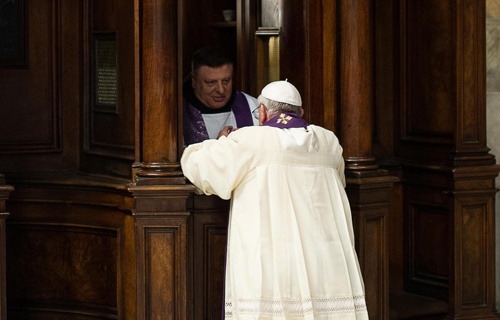That singular and historic moment—no pope had ever been seen going to confession before—may be having an impact this Lent.
We offer the sacrament every day at my parish, and people report longer lines. Tonight, we’re bringing in extra priests to help handle the expected crowds after our 7:30 liturgy.
A New Jersey newspaper takes a closer look at the Sacrament of Reconciliation, and people’s perceptions of it:
One of loneliest places in church these days is the confession line. The act of confessing one’s sins, a requirement for Catholics, has sharply fallen over several decades with evolving views on sin, penance and the stature of the priesthood.
But now Pope Francis and church leaders, in a push to draw people back to confession, are highlighting what clergy say are the healing, uplifting aspects of the sacrament and focusing less on themes like punishment and condemnation.
Some churches are using websites, newspaper ads and highway billboards to get the message out. Under diocesan guidance, churches have also added one extra day a week to hear confession during Lent, the period before Easter when penance is considered a Catholic duty. And the pope, in an image seen and talked about around the world, confessed to a priest last month in public view.
But will these efforts change attitudes among Catholics, many of whom believe confession no longer is a necessary part of the faith?
“It’s not something I look at as something I need to do to be a good Catholic, but I always know it’s there if I feel a need to go,” said Keith Ahearn, a churchgoer who lives in Oakland, N.J.
Ahearn said seeing Pope Francis’ example of confession did cause him to think twice.
“I have to admit,” he said, “seeing the pope going to confession was a pretty powerful thing.”
Under church doctrine, Catholics should go to confession at least once a year, preferably during the Easter season. Those who commit mortal, or serious, sins like adultery and murder should not receive Communion without first going to confession. The point of confession, according to the church, is to bring about a “spiritual resurrection” and to have people reconcile with the church community.
Church leaders are trying to lure people back by putting out positive messages that confession is about peace and joy and not fear or shame.
Some dioceses are adding an extra day of confession during the Lenten season.
Priests are encouraged to talk about reconciliation during Lent, said the Rev. Kevin Corcoran, vice chancellor of the Paterson, N.J., diocese. Corcoran said the response has been positive and that churches are attracting more people to the sacrament.
“We’re seeing people who were away for 20, 30, 40 years from the sacrament,” Corcoran said.
Read more, including some thoughts on what made the sacrament fall out of fashion.












